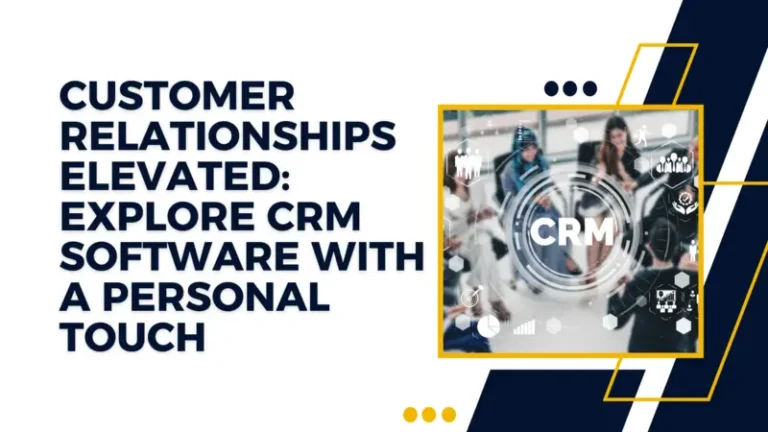The hyper-competitive business landscape requires strong ties with customers. Customers are paramount for a business as they run a business. The customer is king in modern businesses, and it’s important to prioritize customer-centric approaches to drive growth and loyalty. The Customer Relationship Management (CRM) software empowers businesses to create a strong customer bond by fostering connections while maintaining a personal touch.
Customer expectations are ever-evolving, and their significance cannot be overstated. Successful businesses nurture meaningful connections for long-term growth, brand loyalty, and sustained success.
Let us delve into the world of CRM software and explore its significance.
Understanding Customer Relationships
Customer relationships are built on a foundation of trust, satisfaction, and mutual benefit. The interactions, experiences, and emotional connections with customers are pivotal in shaping customer perceptions, behaviours, and loyalty.
The Importance of Strong Customer Relationships
Enhanced Customer Loyalty:
Strong relationships with customers reduce customer churn. Loyal customers can use the best ERP software in UAE to make repeat purchases and advocate for the brand.
Increased Customer Lifetime Value:
Building long-term relationships with customers generates higher revenue and profitability. Customer lifetime value (CLV) increases and extends for a longer period.
Improved Customer Satisfaction:
Strong customer relationships are built when businesses prioritize customer needs, deliver exceptional experiences, and provide personalized support. These customers will feel satisfied and fulfilled.
Word-of-Mouth Referrals:
Satisfied customers utter positive word-of-mouth. These powerful advocates who recommend the products to friends, family, and colleagues, which leads to organic growth.
Competitive Advantage:
Businesses have to ensure growth and sustainability to excel in the field. This helps them gain a competitive edge and build a loyal customer base.
Understanding CRM Software
CRM software is used to manage interactions and relationships with customers and prospects. The benefits of ERP systems help to organize, automate, and synchronize sales, marketing and customer service to enhance customer satisfaction.
Let’s have a look at the features and functionalities, including:
Contact Management:
All the contact information and interactions are managed in a centralized database.
Sales Automation:
Sales processes are automated, including lead management, opportunity tracking, and pipeline management.
Marketing Automation:
The software automates marketing campaigns and email communications and leads nurturing activities to drive customer acquisition and retention.
Customer Service and Support:
The software offers tools for managing customer inquiries, support tickets, and service requests to deliver timely and personalized assistance.
Analytics and Reporting:
Data analytics and reporting features are offered for analyze customer data, trends, and performance metrics. This helps to get insights into customer behaviour, preferences, and satisfaction levels.
Elevating Customer Relationships with a Personal Touch
The CRM software is not just software that acts as a robot. It has powerful capabilities for managing customer relationships that humanize interactions and infuse them with a personal touch.
The CRM software can elevate customer relationships:
Personalized Communication:
CRM data personalizes communication and resonates with individual customers. Customer preferences, purchase history, and engagement patterns are analyzed in the email campaigns, and offers and recommendations are tailored. Customers can feel connected to the business because of its relevance.
Tailor communication and interactions using data and insights to support interactions. Personalization goes beyond addressing customers’ specific needs, preferences, and interests of individual customers.
Customers crave authenticity, relevance, and personalization as a core principle. Businesses can create meaningful connections for the long term. It is a powerful tool for companies to build solid and lasting relationships and drive engagement, satisfaction, loyalty, and, ultimately, business growth.
360-Degree View of Customers:
Organizations strive to gain a comprehensive understanding and build lasting relationships. The concept of 360 degrees allows organizations to achieve it to drive success.
A 360-degree view of customers offers a holistic understanding of all touchpoints and interactions with a brand. It aggregates and analyzes data using customer service inquiries, website visits, and social media engagement. Multiple channels and systems enable personalized and targeted engagement at every touchpoint.
Data from different departments gives the business a holistic view of customers. Various touchpoints and interactions across sales, marketing, and customer service channels enable companies to anticipate customer needs, address issues proactively, and deliver seamless experiences.
Timely Follow-Ups and Reminders:
CRM automation features enhance customer satisfaction. The system schedules follow-up tasks, reminders, and notifications to keep up with important interactions and deadlines. Businesses remain vigilant of important interactions.
Customer Segmentation and Targeting:
There are different types of customers. The software allows the business to segment customers based on demographics, behaviours, or purchase history. CRM segmentation tools enable companies to tailor marketing campaigns. They can promote specific customer segments and deliver more relevant and engaging content.
Integration with Customer Feedback Channels:
Integration with customer feedback channels allows for prompt responses and timely action. Monitoring feedback channels helps stay informed about customer perceptions and sentiments as they evolve.
CRM software captures and analyzes customer feedback in real-time. Customer feedback channels include surveys, reviews, and social media monitoring tools that help identify areas for improvement, address customer concerns, and drive continuous enhancements.
Empowering Frontline Staff:
Frontline staff can access CRM data and insights to deliver personalized and proactive service. Sales reps, customer service agents, and support staff can actively engage with customers and resolve issues efficiently.
Building Long-Term Relationships:
CRM software fosters long-term customer relationships by nurturing trust, transparency, and authenticity. Tracking customer interactions can help anticipate the customers’ evolving needs at each stage of the customer journey.
Conclusion
Customers are the lifeblood of a business, and businesses need to cater to them to make them happy. The happiness of the customers is the ultimate goal of any business. Meeting higher expectations and prioritizing the human element in the interactions is significant. CRM software serves as a valuable tool for delivering personalized experiences. The challenges of implementing ERP software, but Businesses can utilize tools and capabilities to offer meaningful experiences at scale.
CRM software is one such tool that can deepen customer connections, drive loyalty, and differentiate themselves in a crowded marketplace. Businesses can forge genuine relationships with customers to foster better communication.




